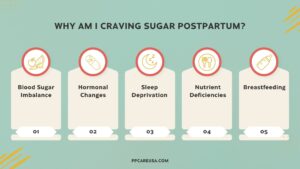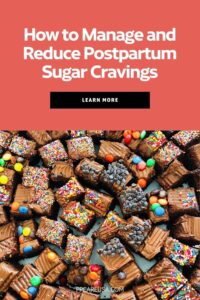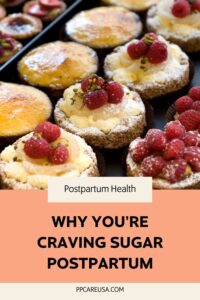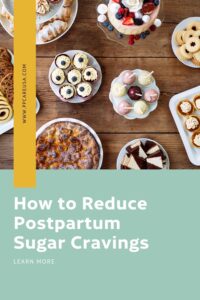If you find yourself reaching for chocolate, cookies, or carbs more often since having a baby, you’re not imagining it. Postpartum cravings—especially for sugar—are very real, and they can be your body’s way of asking for support, not just a lack of willpower.
Your cravings are trying to tell you something—and it’s not that you need to “get it together.” From blood sugar swings to depleted nutrients to hormone chaos, there’s a reason your sweet tooth feels stronger than ever.
But here’s the thing: while the occasional treat is absolutely fine (and sometimes necessary), giving in to every sugar craving without understanding what’s behind it can make things worse. When unmanaged, excessive sugar intake in the postpartum period can mess with your hormone recovery, increase inflammation, disrupt sleep, and contribute to mood swings or anxiety.
In this post, we’re answering your biggest questions:
- Are postpartum cravings a thing?
- How long do postpartum cravings last?
- What causes sugar cravings when breastfeeding?
- And how can you manage them in a way that supports your recovery and hormones?
Let’s dig in.
Are Postpartum Cravings a Thing? (And Is It Normal?)
Yes, we hear from our clients all the time that they crave sweets and carbohydrates, especially in the evenings when the kids are down for the night! Just like pregnancy cravings, postpartum cravings are very common.
Many moms report feeling intense hunger and strong cravings for sugar, carbs, or even salty snacks in the weeks and months after giving birth.
These cravings are often your body’s way of signaling:
- Nutrient deficiencies
- Hormonal shifts
- Sleep deprivation
- Increased energy demands (especially if you’re breastfeeding)
So if you’re craving a brownie at 10 a.m. or a handful of crackers every time you feed the baby—trust us, you’re not the only one.
Why Am I Craving Sugar Postpartum?
Postpartum sugar cravings are often caused by a combination of:
1. Blood Sugar Imbalance
When you’re not eating consistently or your meals lack protein and fat, your blood sugar can swing rapidly—leading to cravings, crashes, and mood swings.
2. Hormonal Changes
Estrogen and progesterone drop significantly after birth, while cortisol (the stress hormone) often stays elevated. These hormonal changes can intensify cravings and disrupt your hunger cues.
3. Sleep Deprivation
Lack of sleep increases ghrelin (your hunger hormone) and decreases leptin (your fullness hormone), making you crave quick energy like sugar and simple carbs.
4. Nutrient Deficiencies
Your body is healing, possibly breastfeeding, and navigating stress—which means you need more nutrients like magnesium, B vitamins, and iron. If your diet is low in these, you may experience more cravings.
5. Breastfeeding
Sugar cravings while breastfeeding are super common. Your body needs more calories to produce milk, and glucose is a preferred fuel source for your brain and milk production. If you’re not getting enough energy or protein, your body will seek out quick fixes—like sugar.
In short? Your cravings aren’t random—and they’re not about willpower. They’re rooted in biology, exhaustion, and the very real demands of healing and feeding another human.
The good news is that understanding why those cravings happen puts you in a better position to manage them. By meeting your body’s needs with balanced nutrition, rest, and support, you can reduce those sugar cravings and support your postpartum recovery in the process.

How Long Do Postpartum Cravings Last?
Every mama is different, but many women experience cravings for several weeks or even months postpartum. They tend to be strongest in the early postpartum period when healing, hormone shifts, and sleep deprivation are most intense.
The good news? As your hormones stabilize, your nutrient stores are replenished, and your sleep improves (even a little), cravings often become more manageable.
How to Stop (or At Least Reduce) Postpartum Cravings
Good news! You don’t have to completely avoid sweets. But stabilizing your blood sugar and meeting your body’s needs can help reduce the intensity and frequency of cravings.
Here’s what helps:
1. Eat Balanced Meals (and Eat Often)
Don’t skip meals! Eat every 3–4 hours and make sure each meal or snack includes:
- Protein: eggs, yogurt, meat, beans
- Healthy fat: avocado, olive oil, nuts
- Fiber-rich carbs: sweet potatoes, oats, fruit
2. Don’t Start the Day with Sugar
A bowl of cereal or toast alone can spike your blood sugar and set you up for cravings all day. Start with protein and healthy fats to stay full longer.
3. Hold the Coffee (At Least for a Bit)
Drinking caffeine on an empty stomach first thing in the morning can spike cortisol levels and disrupt blood sugar regulation—especially when hormones are already fragile postpartum.
Instead, hydrate with water or minerals first, and aim to eat a protein-packed breakfast before your first cup of coffee. This supports more stable energy, better hormone balance, and fewer mid-morning crashes.
4. Stay Hydrated
Dehydration can mimic hunger. Keep water or an electrolyte drink nearby, especially if you’re breastfeeding.
5. Snack Smart
Have healthy postpartum snacks on hand that are quick and satisfying. Some of our favorites:
- Greek yogurt with berries
- Apple slices and almond butter
- Boiled eggs and avocado toast
- Energy bites made with oats, nut butter, and flax
- Hummus and veggies
- Trail mix with nuts and dark chocolate chips
6. Get Curious, Not Judgmental
Instead of beating yourself up for craving sugar, ask: Am I tired? Stressed? Underfed? Dehydrated? Your body is likely trying to tell you something.
Postpartum Cravings Don’t Mean You’re Failing
Cravings are not a moral failing. They’re often a clue that your body needs more nourishment, rest, or support.
By listening to your body and feeding it in a way that supports blood sugar balance and hormone recovery, you can reduce cravings and feel more in control—without extreme dieting or restriction.
Need help finding your balance? At Postpartum Care USA, we offer personalized nutrition and hormone support to help you feel like yourself again. Reach out to schedule a consult.
Pin This for Later:



Postnatal Depletion
Meet the Team
Our Services
Supplements
A virtual healthcare clinic that helps postpartum mamas recover from postnatal depletion syndrome with a holistic approach.

Get in touch